All you need to know about testing for pregnancy – accurately.
Not all pregnancy tests are the same when it comes to accuracy and ease of reading in consumers' hands. In fact nearly 1 in 3 women can misread some types of pregnancy tests, like strips and cassettes[i].
Which Pregnancy Test to Choose
When testing for pregnancy you simply can't afford to get a wrong result so it's important to choose a test that combines three important factors, each of which you can find in ALL Clearblue Pregnancy Tests:
- Over 99% accuracy from the day your period is due
- Ease of use
- Easy read results
Midstream Pregnancy Tests – 9 in 10 women say 'EASY TO USE'[i]
Testing directly in your urine stream is called 'midstream' testing. In a study, we found nearly three quarters of women prefer to test in their urine stream. Midstream pregnancy tests are convenient, hygienic and easy to use. That's why all Clearblue Pregnancy Tests are midstream pregnancy tests and have been especially designed to meet your needs.
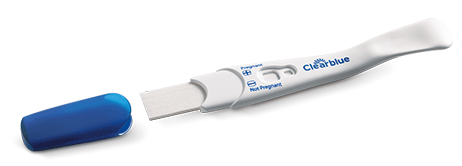
Digital Midstream Pregnancy Tests
For women who want to have more information, Clearblue Digital Pregnancy Test with Conception Indicator is like 2 tests in 1 - not only giving you clear digital ‘Pregnant' or 'Not Pregnant' results, but also telling you how far along you are (1-2, 2-3 or 3+ weeks since conception). It’s over 99% accurate at detecting pregnancy from the day the period is due and the Conception Indicator is as accurate as an ultrasound scan at dating your pregnancy[iii].
Not only that but Clearblue Digital Pregnancy tests can be used up to 4 days before your period is due* and the unmistakably clear 'Pregnant' or 'Not Pregnant' results make them easier to read than traditional line tests, which can be hard to interpret (studies have shown that 1 in 4 women can misread line test results)[iv].
That’s why Clearblue Digital Pregnancy Tests are the ideal choice for any woman.
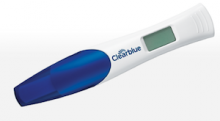 |
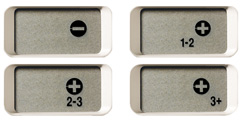 |
-
Strips – 7 in 10 women say 'NOT EASY TO USE'[i]
Strips are typically very small, can be fragile and are rather difficult to use. You need to collect a urine sample, often with no collection device provided, and then dip the small test strip into your sample. With no cap they can be messy and unhygienic – and the result lines are small and often hard to read.

-
Cassettes – 9 in 10 women say 'NOT EASY TO USE'[i]
Consisting of two separate parts, cassettes require you to drop urine on to a 'sample well' with a fiddly plastic pipette – making them feel like a confusing science experiment. The multiple steps and hard-to-read lines make them puzzling to use.
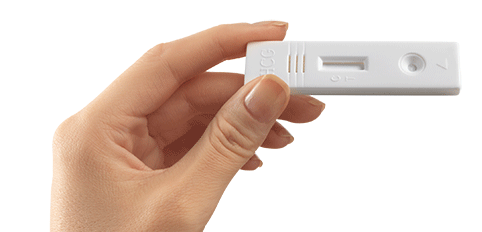
When to take a pregnancy test
Clearblue recommend you test from the day the period is due, however, because levels of hCG rise rapidly in early pregnancy, Clearblue pregnancy tests are so sensitive they may detect pregnancy up to four days before your period is due.
Not all pregnant women who test before the day of their expected period will get a 'Pregnant' result. This is because the hCG levels in their urine may not yet be enough for the pregnancy test to detect.
If you test early and get a 'Not Pregnant' result – but you still suspect you are pregnant – we recommend that you test again on or after the day your period is due.
However, even if you test early, you can be confident in the accuracy of a 'Pregnant' result with any Clearblue Pregnancy Test.
How pregnancy tests work
All home pregnancy tests work by detecting the pregnancy hormone hCG (human chorionic gonadotrophin) in urine. HCG first appears in the urine around the time the fertilised egg implants into the uterus and is thought to be involved in the implantation process. Levels of hCG rise rapidly from the earliest stages of pregnancy (doubling approximately every 24 hours) and reach a peak around 8 – 10 weeks.
Clearblue Pregnancy Tests detect very small amounts of hCG in your urine and are more than 99% accurate from the day your period is due.
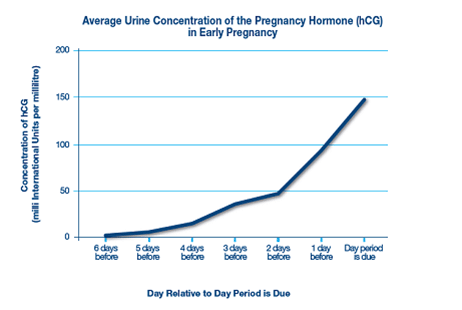
- [i] In a study of 111 women in the UK using and reading different test types in October 2012.
- [ii] Tomlinson C., et al. CMRO (2008) 24(6):1645-49
- [iii]'Weeks' result 97% in agreement with later ultrasound dating scan. Based on studies of 187 women comparing results (1-2, 2-3, 3+ weeks since conception) to ultrasound dating +/- 5 days.
- [iv] Clearblue recommends that you test from the day your period is due. However, the pregnancy hormone increases rapidly in early pregnancy and Clearblue can be used to test up to 4 days before your period is due. In clinical testing with early pregnancy samples Clearblue gave the following results: 55% of women received a 'Pregnant' result 4 days early, 86% of women 3 days early, 97% of women 2 days early,98% of women 1 day early. If you test early and get a 'Not Pregnant' result it is possible that the level of pregnancy hormone may not yet be high enough to be detected. You should test again when your period is due.
